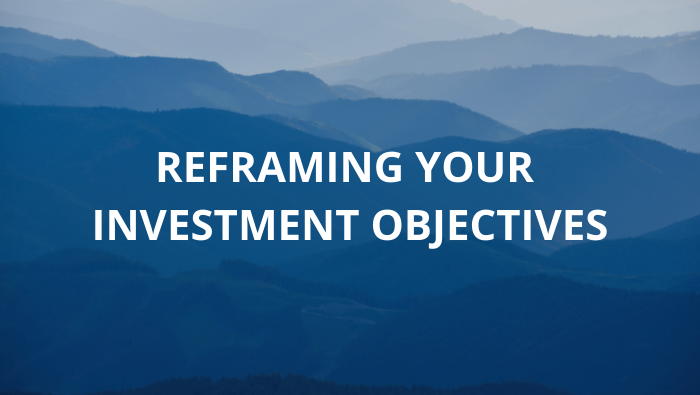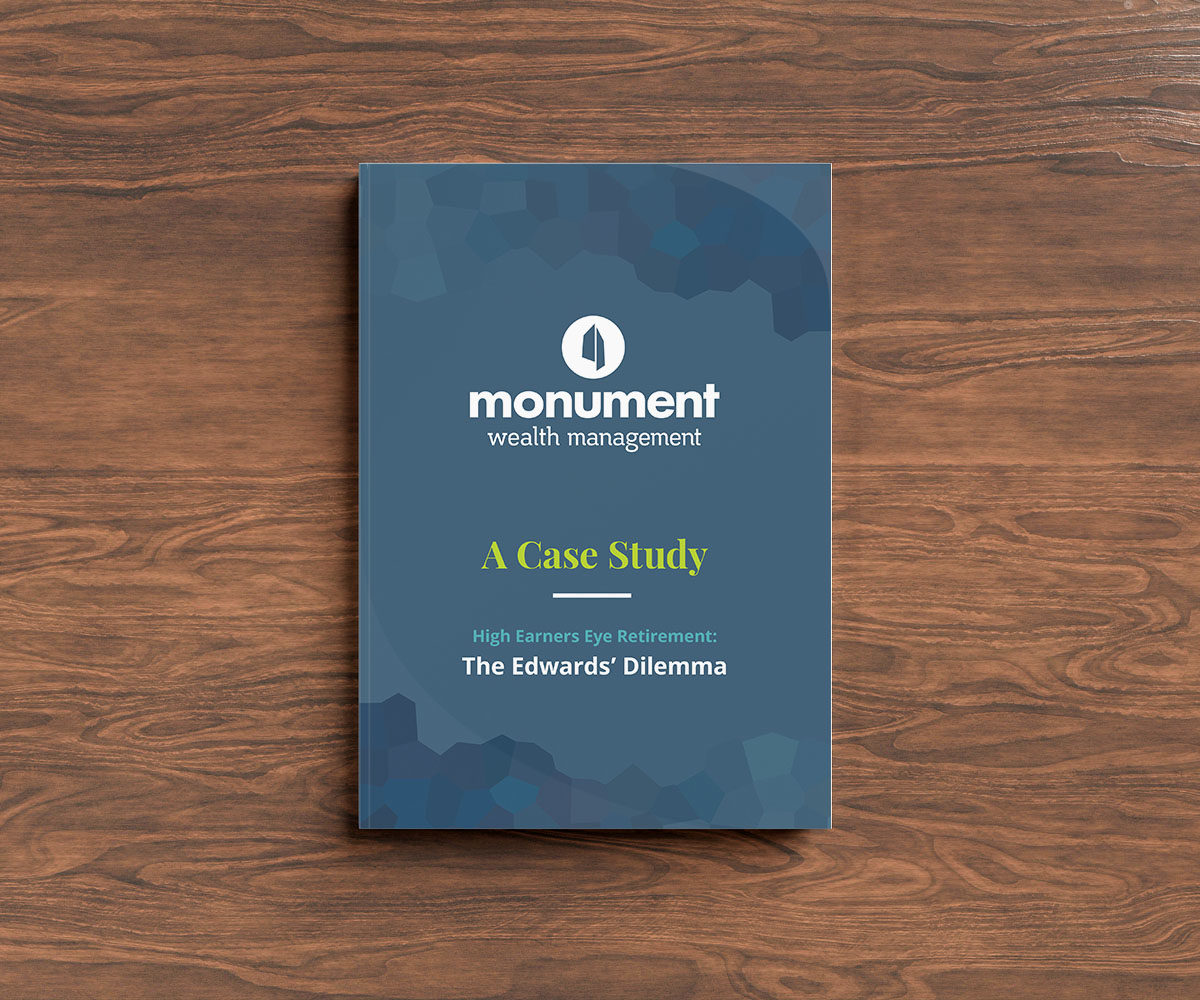Monument Wealth Management Articles
The 3 Mistakes You’re Making With Your Investment Objectives

Share on your favorite platform, or by email
Your investment objectives steer your whole investment strategy, yet many investors don’t give them a second thought. It’s important to take a step back, evaluate how your objectives align with your investment time horizons for when you’ll need your funds, and then make the needed changes so you can actually reach your investment goals.
Mistake #1: “I want to be rich” is not an objective.
An objective is a specific goal and like the actions you take when you want to reach a personal objective (like figuring out a daily workout routine for when you want to lose weight), money should be a means in order to achieve both long-term or short-term goals. And when it comes down to brass tacks, long-term money (like the kind you use during retirement) is invested quite differently when compared to short-term money (like the kind when you’re renovating your house). When you’re stating your objectives, they must be able to accommodate both long-term and short-term money scenarios. Which is why “I want to be rich” really isn’t going to cut it.
The meaning of “rich” truly depends on each person’s own perception. To set a realistic objective, you’ll need to get into the real details of what being wealthy means to you and then determine how to get there. For example, do you simply want to be able to continue to live your life comfortably throughout retirement or do you want to be able to pass on your wealth to future generations? Once you determine what “rich” means to you, you can begin gearing your investment objectives to reach that goal.
Mistake #2: Taking on too much risk.
They say in order to win big, you need to bet big…but gambling mustn’t be confused with investing. Betting too big with your investments would be, for example, taking on an asset allocation that’s too aggressive or choosing to invest in esoteric, illiquid, or leveraged investments. Taking unnecessary risk with your hard-earned money is often not worth the potential reward. When thinking about your investment objectives, don’t go with the “risk it all” mentality. Instead, build your portfolio to take advantage of high probabilities of success over time. The historical odds of making money in the S&P 500 over one day is 52%, roughly 68% in one-year periods, 88% in 10-year periods, and 100% in 25-year periods. Anything that keeps you in the game has a quantifiable advantage. Set your investment objectives to align with your life goals and remember, never risk what you have and need for what you don’t have and don’t need.
If a portfolio is too aggressive, an investor also runs the risk of panicking during a protracted drawdown or sudden volatility. Consider it this way…if you felt the emotions were high when you were making the investments in the first place, odds are the feelings might return ten-fold when you get scared to lose it all. Rule of thumb: Objectives have to match both the use of the money and temperament of the investor.
Mistake #3: Failing to strategize.
While setting an objective that matches both time and temperament is important, asset location is critical to success as well. That’s why investors should align objectives to structures. For example, when saving for retirement, maximizing tax-deferred accounts first is critical to long term success. By doing this, you remove the long-term headwind of taxes and allow earnings to compound tax-deferred over many years. And here at Monument, we sure do love an efficient tax strategy.
Just as important as maximizing tax-deferred accounts for long-term goals like retirement, regularly investing outside of a retirement account can give you flexibility when it comes to goals that may be shorter-term in nature and provide more control over your tax picture in the future. If you only save in tax-deferred accounts, you may inadvertently have higher taxable income in the future than you planned for. Supplementing tax-deferred accounts with a taxable portfolio (which is taxed at advantageous capital gains rates under current tax laws when assets are sold) may reduce your overall tax bill and provide a source of funds to tap into before age 59 ½ .
Avoid the mistakes altogether.
Your investment objectives are arguably one of the most important components to your overall financial strategy, as they will determine the type of investments that are within your best interest.
Having too vague of a goal or misunderstanding the importance of planning it out can be detrimental to your portfolio. But you may not realize it until it’s too late. So why not eliminate the possibility of making a wrong move now? Monument Wealth Management is waiting with a stable shoulder to lean on.
Our Private Wealth Design is a collaborative, creative, and customized approach to turning your ideas and goals into a blueprint that represents the life you want to live and a realistic path to get you there. Our seasoned pros don’t waste your time with technical (and frankly boring) jargon–we’re honest and straight-forward. Our only objective is to lead you to financial freedom and have you living the lifestyle you want. If you’re ready to make a plan and feel confident in your investments, give us a call.
Oh, and dogs are always welcome.

It’s time to find clarity around your finances and remove the anxiety of the unknown.
Read our case study, “High Earners Eye Retirement,” to see how we helped one of our clients with their wealth planning.
Ready for straightforward, unfiltered opinion and tailored advice for YOUR
questions, not everyone else’s?
IMPORTANT DISCLOSURE INFORMATION
Please remember that past performance is no guarantee of future results. Different types of investments involve varying degrees of risk, and there can be no assurance that the future performance of any specific investment, investment strategy, or product (including the investments and/or investment strategies recommended or undertaken by Monument Capital Management, LLC [“Monument”]), or any non-investment related content, made reference to directly or indirectly in this blog will be profitable, equal any corresponding indicated historical performance level(s), be suitable for your portfolio or individual situation, or prove successful. Due to various factors, including changing market conditions and/or applicable laws, the content may no longer be reflective of current opinions or positions. Moreover, you should not assume that any discussion or information contained in this blog serves as the receipt of, or as a substitute for, personalized investment advice from Monument. To the extent that a reader has any questions regarding the applicability of any specific issue discussed above to his/her individual situation, he/she is encouraged to consult with the professional advisor of his/her choosing. No amount of prior experience or success should be construed that a certain level of results or satisfaction will be achieved if Monument is engaged, or continues to be engaged, to provide investment advisory services. Monument is neither a law firm nor a certified public accounting firm and no portion of the blog content should be construed as legal or accounting advice.
A copy of Monument’s current written disclosure Brochure discussing our advisory services and fees is available for review upon request or at www.monumentwealthmanagement.com/disclosures. Please Note: Monument does not make any representations or warranties as to the accuracy, timeliness, suitability, completeness, or relevance of any information prepared by any unaffiliated third party, whether linked to Monument’s website or blog or incorporated herein, and takes no responsibility for any such content. All such information is provided solely for convenience purposes only and all users thereof should be guided accordingly.
Historical performance results for investment indices, benchmarks, and/or categories have been provided for general informational/comparison purposes only, and generally do not reflect the deduction of transaction and/or custodial charges, the deduction of an investment management fee, nor the impact of taxes, the incurrence of which would have the effect of decreasing historical performance results. It should not be assumed that your Monument account holdings correspond directly to any comparative indices or categories. Please Also Note: (1) performance results do not reflect the impact of taxes; (2) comparative benchmarks/indices may be more or less volatile than your Monument accounts; and, (3) a description of each comparative benchmark/index is available upon request.
Please Remember: If you are a Monument client, please contact Monument, in writing, if there are any changes in your personal/financial situation or investment objectives for the purpose of reviewing/evaluating/revising our previous recommendations and/or services, or if you would like to impose, add, or to modify any reasonable restrictions to our investment advisory services. Unless, and until, you notify us, in writing, to the contrary, we shall continue to provide services as we do currently. Please Also Remember to advise us if you have not been receiving account statements (at least quarterly) from the account custodian.